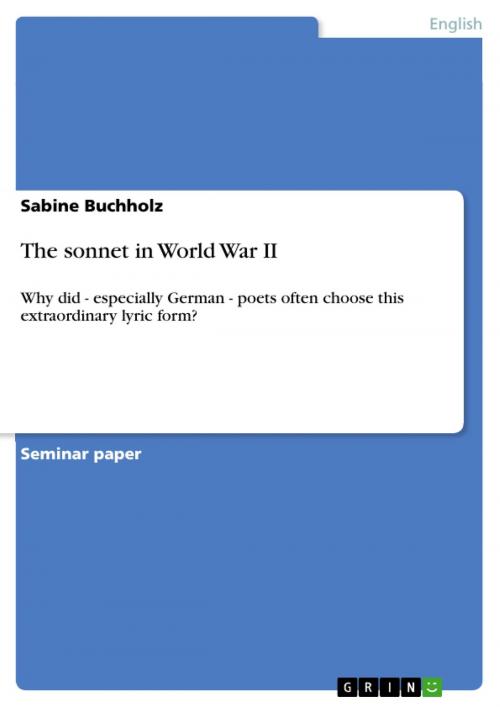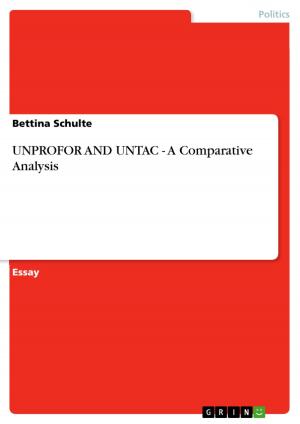The sonnet in World War II
Why did - especially German - poets often choose this extraordinary lyric form?
Fiction & Literature, Literary Theory & Criticism, British| Author: | Sabine Buchholz | ISBN: | 9783638906197 |
| Publisher: | GRIN Publishing | Publication: | January 30, 2008 |
| Imprint: | GRIN Publishing | Language: | English |
| Author: | Sabine Buchholz |
| ISBN: | 9783638906197 |
| Publisher: | GRIN Publishing |
| Publication: | January 30, 2008 |
| Imprint: | GRIN Publishing |
| Language: | English |
Seminar paper from the year 2006 in the subject English Language and Literature Studies - Literature, grade: 1,0, University of Siegen (FB 3: Literatur-, Sprach- und Medienwissenschaften), course: Sonette / Sonnets, 21 entries in the bibliography, language: English, abstract: In times of emigration, the strict lyrical form of the sonnet had a special position and meaning, above all for the emotionally agitated poets themselves, who identified a lot with their emotive texts. Especially among German authors of the inner emigration, the sonnet was considered the 'Modeform des Widerstandes' , as it was the dominating genre - and this is for several reasons, which are going to be examined in the course of this essay. First of all, one highly interesting fact has to be mentioned: The sonnet could and can only be found conspicuously seldom in national socialist lyric anthologies because, having its roots in a roman tradition, the form was considered to be 'artfremd' and 'undeutsch' - and, hence, it was not appropriate to the taste of the German national socialist 'Reichschrifttumskammer'. The common opinion of the time was that the sonnet was too 'bright' for the German nature, so that - on top of everything - this strict lyrical form was regarded as 'Typikum der antifaschistischen Kräfte'. This essay attempts at exemplarily outlining how and why the form of the sonnet was applied by poets in the time of the Second World War, especially by a number of German authors. What are the extraordinary features this lyrical form offered (and still offer) various artists in a time so full of emotions, of fear, despair, but also hope and anger? And how did poets make use of these features; how did they develop them? These questions are to be illuminated by looking at a number of concrete examples of wartime poets, which will certainly display a colourful demonstration not only of different working methods and applications of the sonnet form, but also of divergent feelings and ways to handle a gruesome fate.
Seminar paper from the year 2006 in the subject English Language and Literature Studies - Literature, grade: 1,0, University of Siegen (FB 3: Literatur-, Sprach- und Medienwissenschaften), course: Sonette / Sonnets, 21 entries in the bibliography, language: English, abstract: In times of emigration, the strict lyrical form of the sonnet had a special position and meaning, above all for the emotionally agitated poets themselves, who identified a lot with their emotive texts. Especially among German authors of the inner emigration, the sonnet was considered the 'Modeform des Widerstandes' , as it was the dominating genre - and this is for several reasons, which are going to be examined in the course of this essay. First of all, one highly interesting fact has to be mentioned: The sonnet could and can only be found conspicuously seldom in national socialist lyric anthologies because, having its roots in a roman tradition, the form was considered to be 'artfremd' and 'undeutsch' - and, hence, it was not appropriate to the taste of the German national socialist 'Reichschrifttumskammer'. The common opinion of the time was that the sonnet was too 'bright' for the German nature, so that - on top of everything - this strict lyrical form was regarded as 'Typikum der antifaschistischen Kräfte'. This essay attempts at exemplarily outlining how and why the form of the sonnet was applied by poets in the time of the Second World War, especially by a number of German authors. What are the extraordinary features this lyrical form offered (and still offer) various artists in a time so full of emotions, of fear, despair, but also hope and anger? And how did poets make use of these features; how did they develop them? These questions are to be illuminated by looking at a number of concrete examples of wartime poets, which will certainly display a colourful demonstration not only of different working methods and applications of the sonnet form, but also of divergent feelings and ways to handle a gruesome fate.















